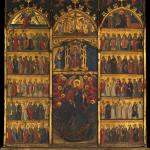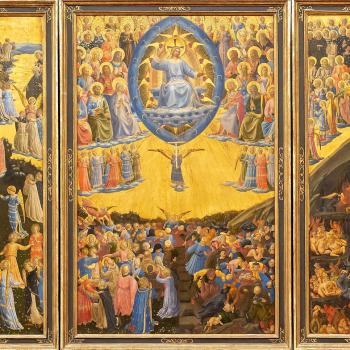
Paul, speaking eschatologically, tells us that Christ will give all things over to God so that God can be and will be all in all:
Then comes the end, when he delivers the kingdom to God the Father after destroying every rule and every authority and power. For he must reign until he has put all his enemies under his feet. The last enemy to be destroyed is death. “For God has put all things in subjection under his feet.” But when it says, “All things are put in subjection under him,” it is plain that he is excepted who put all things under him. When all things are subjected to him, then the Son himself will also be subjected to him who put all things under him, that God may be everything to every one (1 Cor. 15:24-28 RSV).
Paul is speaking from our perspective, the perspective of temporal creatures. The Logos assumed human nature and entered into history. As such, we perceive the way the Logos works with us, brings us all together, and overcomes the powers of sin and death with a historical perspective. The transcendence of God remains transcendent to us, so that in our unity with God, we find ourselves surrounded by and embraced by the greatness of the divine; this, then, is the subjugation which Paul talks about, the way in which we find ourselves encompassed by the divine life. We first subjugate ourselves to Christ, that is, open ourselves up to him in love, so that through that love, we are made one with him; then, because Christ is both human and divine, we find our unity with Christ brings us to our loving unity, and therefore our subjugation, to the divine.
This is how things appear to us in relation to our temporal experience. We go from our fallen state to our eschatological state, from our separation from God (due to sin) to unity with God. When we find ourselves united with God, we will see that God is indeed all in all. God, however, is eternal, and so all that is said about the way things will be in the eschaton already are such for God. For God, God is already all in all; there no sense of anything truly existing in the divine eternity in such a way that it exists in opposition to God and the divine life. “Thus, He Himself with His whole being contains all things that are within Him and outside Him, nor is He, the infinite One, separated from all things nor are all things not present within Him who is infinite.” [1] This is why it is possible for St. Isaac of Syria to say: “Sin, Gehenna, and death do not exist at all with God, for they are effects, not substances.” [2] Sin, Gehenna, and death are privations; ontologically, they represent a lack instead of a substance. Likewise, such a lack is only a temporal phenomenon: it has a beginning and an end (when that privation will be healed by grace, thereby “abolishing” it). “Sin is the fruit of the will; there was a time when sin did not exist, and there will be a time when it will not exist. Gehenna is the fruit of sin; at some point in time it received a beginning, but its end is not known. Death, however, is a dispensation of the wisdom of the Creator; it will have power over nature only for a time; then it will be totally abolished.” [3]
Here, we have come to one of those ontological paradoxes which develop as a result of temporal existence. What happens in time is real. We have been given freedom, so that in our temporal existence, we can and will act contrary to the will of God. And in this fashion, through our actions, we can experience separation from God, and from that separation, experience the privation of our very being (represented by death and Gehenna). But yet, when we look at things in eternity, all things are one with God because God is eternally all in all. While we can contemplate how this can be, and offer various ways to explain it, only when we ourselves experience eternal life will we be able to transcend the paradox and see how our temporal existence does not contradict the reality that God knows in the divine life. Nonetheless the truth that sin, Gehenna, and death are not eternal provides the foundation for the good news of the Gospel. Knowing they are limited, we know that all the pains and sorrows we experience in temporal existence can and will come to an end, while our life does not. This gives us hope, a hope which we are to promote for such a hope promotes faith while fear destroys it:
Divine hope uplifts the heart, but fear of Gehenna crushes it. The light of the mind gives birth to faith; faith gives birth to the consolation of hope; hope fortifies the heart. Faith is the unveiling of the understanding. When the mind is darkened, faith is hidden, fear holds sway over us, and our hope is cut off. It is not the faith that comes from instruction which frees a man from pride and doubt, but the faith that is beheld and dawns in the understanding; this is called knowledge and the revelation of truth. As long as the mind perceives God as God by His being revealed to the understanding, fear will not approach the heart. When we are permitted to be in darkness and we lose this perception, then fear will assail us until we are humbled and we draw nigh to humility and repentance. [4]
We should reflect upon the eschatological glory and the hope that is contained in it; if we focus on the disordered phenomena we experience in temporal existence, we often find ourselves attached to those things which lead us to the very hell which we do not want to experience. Hope lifts us up, giving us faith, while the despair of sin turns us away from God, from the good news; the only good thing about it, Isaac tells us, is when we experience such phenomena we know something is wrong so that we can then turn our eyes back to God and the hope of eternity. The Gospel, thus, is about the supra-temporal truth of God and the way God is able to meet with us and provide us what we need. And so, as Bulgakov says, we can begin to experience the glory of the age to come, of eternity itself, in our temporal existence, because when we meet with God, we get a glimpse of and experience of God’s eternity:
However, the actual reception of the Gospel is not imprisoned in immobility, but on the contrary is being rediscovered anew at all times in history along with humanity’s life in Christ. It is not letter, but spirit. It is not given to one time only, but to all times, it is supra-temporal and in that sense eternal. Moreover, it belongs not just to this life, but to the age to come. [5]
The glory of eternal life is given out to all times because God is all in all; God is everywhere present and fills all things. The kingdom of God is already within us; we just have to uncover it. When we fully realize our unity with God, we will experience all things in and through the perspective of eternal life, and when we do, we will understand how God has always been with us, and so why, indeed, privations of sin, Gehenna and death, have always been insubstantial even when we have experienced them for ourselves. And so, we have a reason for our hope, the reason being what we know of God, that God is indeed eternal, giving forth to all creation the unending love which lifts all things up , making room for them so that they can experience the glory of the divine life for themselves.
[1] St. Hilary of Poitiers, The Trinity. Trans. Stephen McKenna, CSSR (New York: Fathers of the Church, Inc., 1954), 7.
[2] Saint Isaac the Syrian, The Ascetical Homilies of Saint Isaac the Syrian. Trans. Monks of the Holy Transfiguration Monastery. Rev. 2nd ed (Boston, MA: Holy Transfiguration Monastery, 2011), 257 [Homily 27].
[3] Saint Isaac the Syrian, The Ascetical Homilies of Saint Isaac the Syrian, 257 [Homily 27].
[4] Saint Isaac the Syrian, The Ascetical Homilies of Saint Isaac the Syrian, 384 [Homily 51].
[5] Sergii Bulgakov. The Apocalypse of John: An Essay in Orthodox Dogmatics. Trans. Mike Whitton. Rev. Michael Miller (Munster: Aschendorff Verlag, 2019), 116.
Stay in touch! Like A Little Bit of Nothing on Facebook.
If you liked what you read, please consider sharing it with your friends and family!











